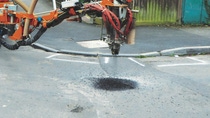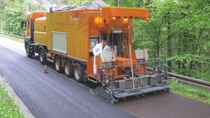Dispersions & Resins
Applications
Pavement preservation covers a wide range of applications to protect engineered roads and extend service life. From filling small cracks and voids to entire thin lift overlays, BASF offers polymer solutions for all types of asphalt paving applications.
The preservation of road surfaces covers a wide range of applications for the protection of asphalt roads and the extension of service life. BASF offers polymer solutions for all types of asphalt, from filling small cracks and cavities to entire thin lift overlays.
Hot Mix Asphalt Pavement (HMA) and Warm Mix Asphalt Pavement (WMA) with improved stability
Hot mix asphalt is a mixture of aggregates like gravel and sand and bitumen that requires heating before installation. Hot mixed asphalt is heated to a temperature of approx. 170-180°C in the production factory before it is loaded and laid on the construction site. Warm mix asphalt is applied at a temperature of around 30 - 40°C lower than an HMA. The warm mixed asphalt is only heated to a temperature of approximately 130-150°C. Both are most useful for large-scale paving applications. The advantages are the durability and the flexibility and malleability, that allow it to shrink and expand during different temperatures without cracking or becoming damaged.
Our Modifiers are especially developed for dosage direct into the pug mill of a Hot Mix Asphalt plant. With more flexibility, less cost and a portfolio of high optimized effective modification you can engineer HMA with exact the properties you need.
Cold Mix Asphalt (CMA) and Bitumen Emulsions
The areas of application of the bitumen emulsion are road construction as well as building protection. In road construction cold mix asphalt is the most basic of asphalt types. As the name implies, cold mix asphalt does not require heating for application. Cold mix asphalt is most useful for repairs like small cracks and potholes or patches. You can purchase cold mix asphalt in single bags that are the perfect size for small patches. Cold mix asphalt should only be used in temporary situations. It is only designed to last a season or two at most before being replaced by a more permanent fix.


.jpg)
.jpg)

.jpg)
.png)
.jpg)
.jpg)

